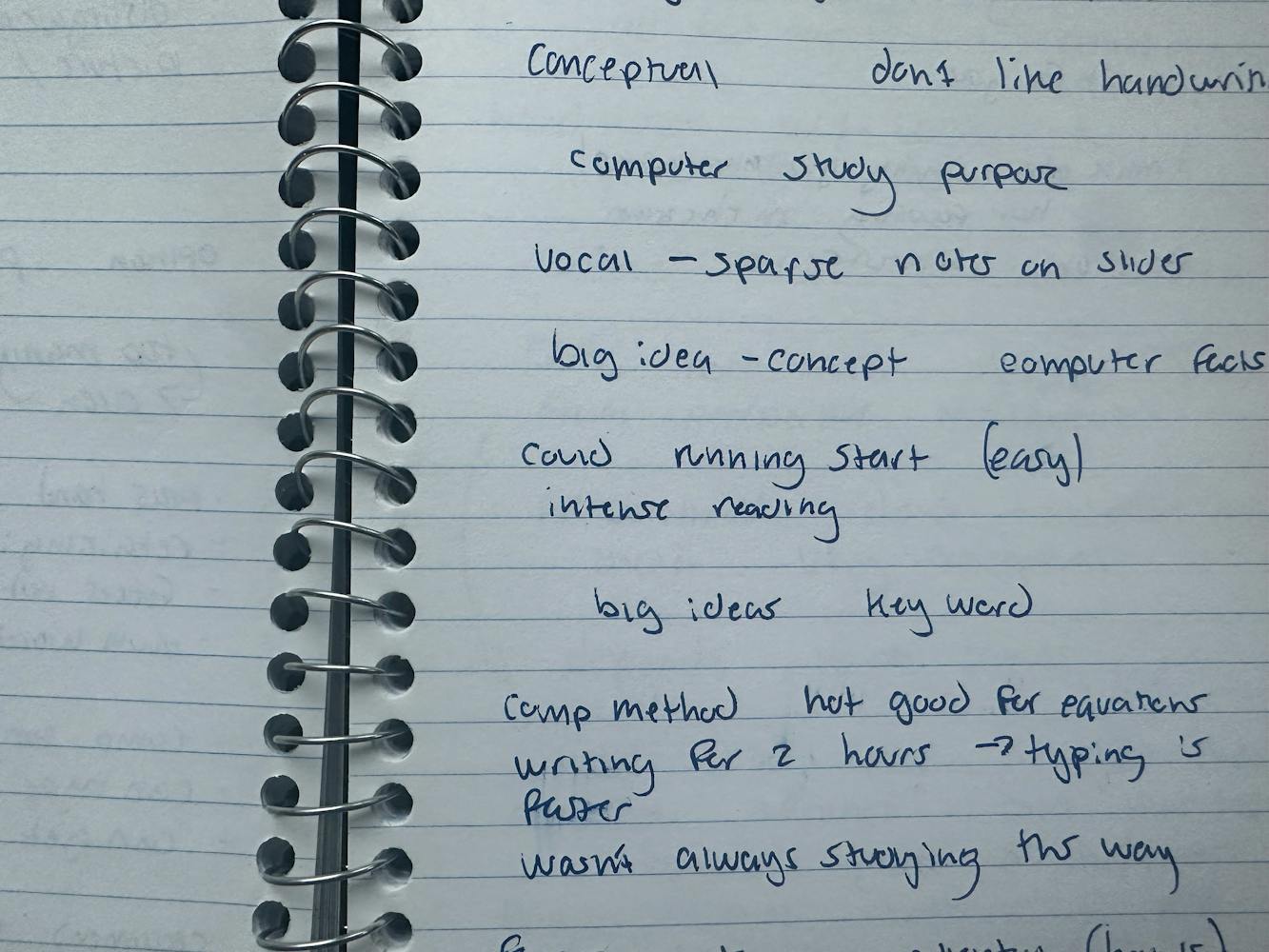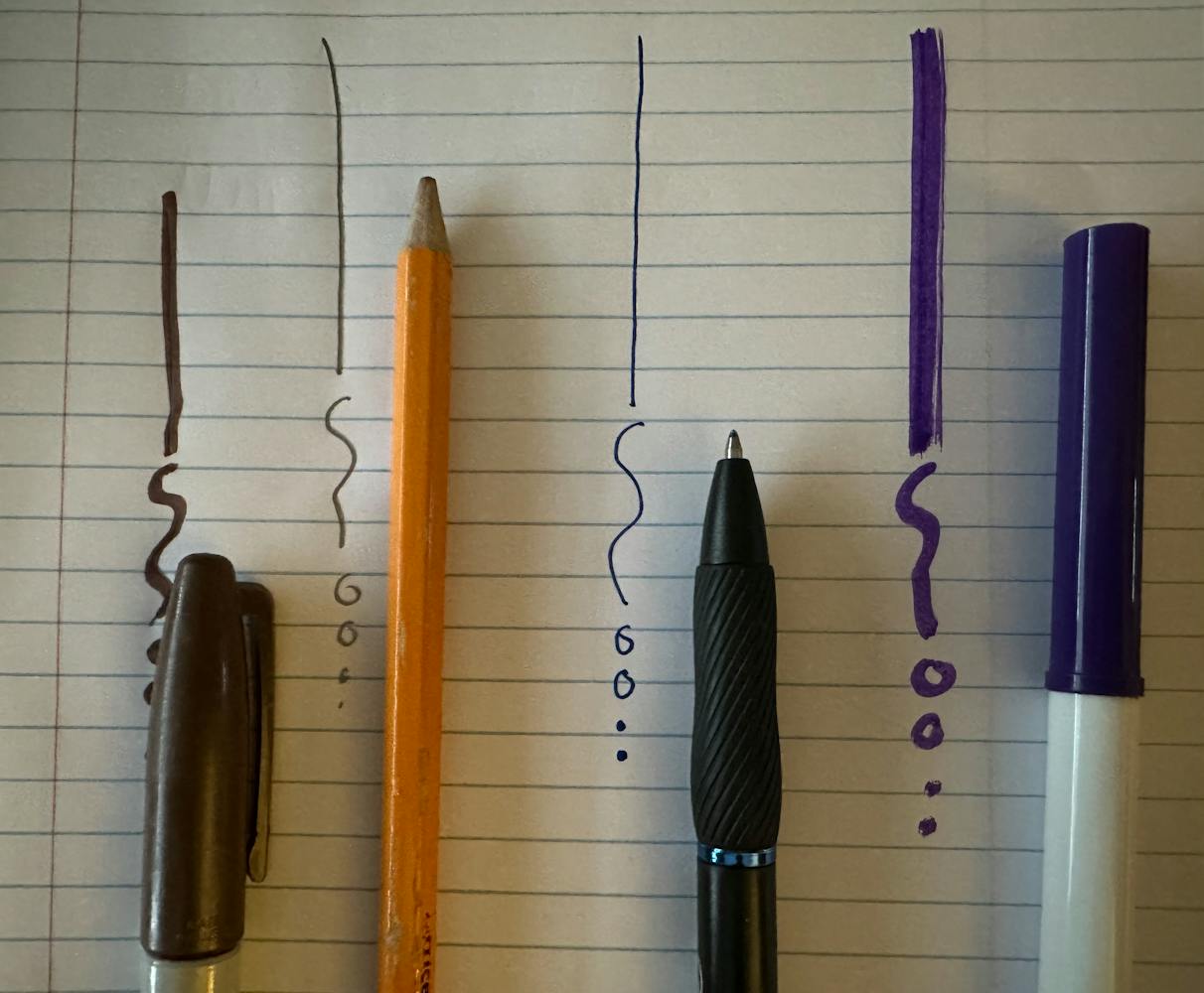The medium of note-taking seems like a trivial topic. Some people type their notes, others handwrite them, and that's all there is to it – at least, that's what I thought.
Since I have always handwritten my notes (because typing them never appealed to me), I was curious: do people who take notes by hand earn better grades than those who type?
I’ve always been told that longhand notes are the clear answer to better retention. Copy what you see on the projector, while simultaneously tracking what the professor is saying, and repeat.
Initially, this is how I took notes.
Growing up, I had no choice but to write my notes since laptops weren’t introduced to me until middle school. Even after they were, I stayed true to pen and paper.
Most people would agree that writing out your notes is more beneficial to retaining information.
“When I say ‘You should really take notes on paper, it’ll work better even if you never look at it again,’ I don’t think that's controversial. A lot of people do seem to take notes in pen and paper,” said Jennifer Seltz, a history professor at Western Washington University.
Most of her classes, especially those that offer general university credit, are largely lecture and reading-based.
One study done at Princeton University looked at note-taking techniques of college students. Researchers asked pairs of students to record notes on a TED Talk. One student had a computer and the other used pen and paper.
They found that on questions requiring students to apply concepts, students who used a laptop to record notes scored worse than those who hand wrote their notes. All students, regardless of note-taking medium, scored similarly on fact-based questions.
Whether you are typing or writing, transcribing information verbatim tends to be the least effective method. Verbatim note-taking was all I had come to know at that point. This is when I realized I should change my note-taking habits.
The aforementioned study also found students whose notes were not copied word-for-word scored higher on the test.
Students and teachers witness this in their own note-taking style and agree that transcribing verbatim isn’t worth it.
“With laptops, you take notes so fast. You can write down lots of stuff just transcribing everything, but the issue is, are you processing anything conceptually?” said Michi Matsukura, an assistant professor in Western's department of psychology.
While transcribing, students are not only unfocused on processing concepts, they miss out on important things said by the professor out loud.
“I miss out on a holistic picture of what was talked about in class because oftentimes the professor will throw in a personal experience or an example that isn’t on the slide. I feel like I miss out on those little bits that are important and often help you remember material,” said Abigail Ross, a former student of Matsukura in her last year at Western.
A different study found that another reason computers aren’t the best form to take notes with is because of – you know all too well – access to the internet.
In this study, the researchers monitored students’ internet usage during the lectures while accounting for students’ interest in the topic, their motivation and their intelligence (SAT scores). The researchers found that levels of intelligence, motivation and interest barely affected how often students used the internet during the lectures.
It doesn’t matter if a student is interested in the class or topic, has the motivation or is intelligent, as defined by standardized testing.
“What they found [is] students are not able to get away from using the internet for non-academic purposes during the lectures,” Matsukura said, referencing a different study on the same question conducted at Michigan State University.
Not only is the internet distracting to the user, but it also distracts people around the user.
“When I go to meetings or conferences and I have the option to check my email or text or shop, I will do it even if I’m really interested in what's happening,” Steltz said.
See? It happens to our teachers, too. It's hard to escape the temptations of texting, TikTok or Amazon, even in the middle of a situation that demands our attention.
Students find it hard to concentrate equally as much, if not more so.
Mikaela Keller, also a former student of Matsukura in her last year at Western, said she has to attentively shift her focus back to the lecture or the presentation after being hypnotized by a student in class online.
Personally, I find it hard to look away from someone guessing the Wordle, especially when I already know the word.
After this research, I concluded that my note-taking style needs some work. Transcribing is a lot of effort for diminishing returns. Conceptual note-taking is where it’s at – big ideas, key terms and interesting facts.
Keller said she also used to transcribe her notes like I did, but after taking Cognition 210 with Matsukura, she changed her ways. Keller said that conceptual note-taking simply made more sense to her and she found it to be more helpful in her studies than transcribing or note-taking with no plan.
However, the switch wasn’t easy.
“It was almost like fear of missing out. I was having kind of FOMO around not writing down every single thing that was on the PowerPoint,” said Keller.
Sometimes the switch is big and difficult, like going from zero note-taking to taking notes for a full set of classes in a quarter, as was the case with students like Spencer Thomas when they returned to in-person school after quarantine was lifted.
Another tip I found helpful was to leave white or blank spaces in your notes no matter the form.
“If you just have a page of, whether it's typed or written, notes with no breaks in there it's going to be so hard to navigate that. And so much of note-taking is being able to go back and find information easily,” said Matt Hawthorne of Hawthorne Learning Solutions. Hawthorne owns and operates this tutoring facility with his wife, Emma.
I have started only writing down key phrases and ideas during interviews for stories. It has been really helpful in going back to identify quotes and information I’d like to include from the people I talk to. For classes, I do something very similar except I try to copy down a bit more of the information in my words. Not so much a transcription but a paraphrase of important information.
Note-taking is a complicated subject with many variables to account for, like handwritten versus digital and conceptual versus transcription. At the end of the day they are your notes, so do what works best for you.
Sophie Bechkowiak (she/her) is writing for the opinion beat at The Front this quarter. She is in her fourth year at Western working towards a journalism news/editorial major and a philosophy minor. On her days off she enjoys thrifting, art, watching documentaries and goofing around with friends.
You can reach her at sophiebechkowiak.thefront@gmail.com.








